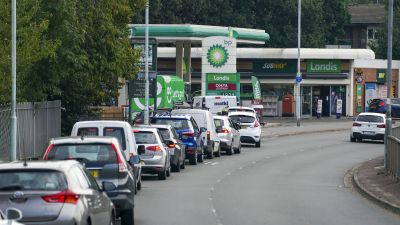BP triples profits and boosts dividend as energy prices soar amid cost of living squeeze

ITV News Business and Economics Editor Joel Hills reports on how bumper profits from energy firms have prompted growing calls for minister to tax companies further to help households with rising bills
BP has revealed second-quarter profits more than tripled as it reaped the benefits of soaring oil and gas prices during Britain's cost of living crunch.
The oil giant will boost its dividend after reporting underlying replacement cost profits – its preferred measure – jumping to US $8.5 billion (£6.9 billion) for the three months to June 30, up from $2.8bn (£2.3bn) a year ago.
The result is better than expected and will likely stoke further controversy over massive profits from oil and energy firms, following record profits from rival Shell and huge earnings from British Gas owner Centrica last week.
BP delivered cheer to investors by announcing a 10% rise in its dividend shareholder payout as trading opened Tuesday.
Its surging share price led FTSE100 risers as BP ramped up its share buyback plan with another $3.5bn (£2.9bn) due before the end of September.
BP's profits come as UK households face surging energy bill prices, as inflation hits a 40-year high at 9.4%, and Russia's conflict in Ukraine impacts energy prices.
BP warned that there is not expected to be any let up with energy prices over the summer, forecasting that crude oil and gas prices will remain high over the third quarter due to supply disruption from Russia.
Its reported half-year figures were affected by a massive $24.4bn US dollar (£19.9 bn) hit from its move to ditch the firm’s near 20% stake in Russian oil producer Rosneft in response to the Ukraine war, leaving it with bottom line replacement cost losses of $15.4 bn (£13bn).Money Saving Expert Martin Lewis last week called on the government to intervene as energy prices soar - warning it will have a "frankly catastrophic" impact on millions later this year.
The latest predictions estimate the energy price cap will increase by 77% on October 1 to £3,500, and in January next year it will rise even further.
The government has announced a support package to ease the impact, by handing £400 in energy bill discounts to households this October.
However it is facing pressure to increase the handouts, which have also included £650 to eight million low-income households, £150 for those on disability benefits, and £300 for pensioners.
The energy price cap rise will provoke a £1,500 a year hike in bills for the average UK household, which is "simply unaffordable for millions of homes" and is likely to put upwards of 10 million people into fuel poverty, Mr Lewis told ITV News last week.
Martin Lewis spoke to ITV News last week about the 'devastating' impact of the 'simply unaffordable' price hikes Britons are facing
The National Grid also last week warned prices could surge even higher if Russia cuts off natural gas flow to Europe amid its war in Ukraine, in its early outlook for winter.
Russia is one of the biggest energy suppliers in the world.
There are fears Vladimir Putin's war will drive up energy bills even further, after Moscow reduced gas flows through the Nord Stream 1 pipeline - sending wholesale gas prices rocketing in a further hit to Britons' wallets.
Want a quick and expert briefing on the biggest news stories? Listen to our latest podcasts to find out What You Need To Know...
The government is introducing a windfall tax on the profits of energy companies.
But it has faced criticism for giving strong incentives to allow companies to invest in oil and gas, while there are no tax incentives in the policy for green investment.
Brexit opportunities minister Jacob Rees-Mogg voiced opposition to the tax on Tuesday after BP's profits were announced.
He told LBC radio: “I’m not in favour of windfall taxes. The energy industry is enormously cyclical.
“You need to have a profitable oil sector so it can invest in extracting energy.”
The windfall tax plans were introduced by No. 10 hopeful Rishi Sunak in May, when he was chancellor, in a dramatic U-turn aimed at raising cash for a new package of support to help with the cost of living.
Tory leadership contender Liz Truss has said she will not impose further windfall taxes on oil and gas companies if she becomes prime minister.
"I don't believe in windfall taxes because they put off future investment," she said, when asked if it was time for another windfall tax after Shell's record profits.
Labour shadow chancellor Rachel Reeves tweeted in reaction to BP's profits: "People are worried sick about energy prices rising again in the autumn, but yet again we see eye-watering profits for oil and gas producers."Labour argued for months for a windfall tax to help bring bills down, but when the Tories finally u-turned they decided to hand billions of pounds back to producers in tax breaks"It's clear people need greater protection from rising bills. That's why Labour would use this money now to help people get through the winter."